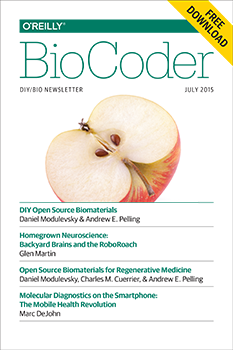Download a free copy of the new edition of BioCoder, our newsletter covering the biological revolution.
We are thrilled to announce the eighth issue of BioCoder. This marks two years of diverse, educational, and cutting-edge content, and this issue is no exception. Highlighted in this issue are technologies and tools that span neuroscience, diagnostics, robotics, gene editing, microbiome sequence analysis, and more.Glen Martin interviewed Tim Marzullo, co-founder of Backyard Brains, to learn more about how their easy-to-use kits, like the RoboRoach, demonstrate how nervous systems work.
Marc DeJohn from Biomeme discusses their smartphone diagnostics technology for on-site gene detection of disease, biothreat targets, and much more.
Daniel Modulevsky, Charles Cuerrier, and Andrew Pelling from Pelling Lab at the University of Ottawa discuss different types of open source biomaterials for regenerative medicine and their use of de-cellularized apple tissue to generate 3D scaffolds for cells. If you follow their tutorial, you can do it, too!
aBioBot, highlighted by co-founder Raghu Machiraju, is a device that uses visual sensing and feedback to perform encodable laboratory tasks. Machiraju argues that “progress in biotechnology will come from the use of open user interfaces and open-specification middleware to drive and operate flexible robotic platforms.”
Joshua Elkington and Vikram Dhillon provide two different reviews of technologies. One on the available equipment for personal biotechnology and the other on the use of the CRISPR-Cas system for genome editing.
After you’ve sent samples to uBiome for sequence analysis, what do you do with that microbiome data? Richard Sprague writes about tools for analyzing your raw microbiome sequence information to help you learn more about the diversity in your personal ecosystem.
Write an article for BioCoder:
What are you doing to make biology or biotechnology more accessible? Are you developing low-cost laboratory hardware, open-source software tools for data analysis or bioinformatics, tools in biology education, laboratory automation, easy-to-use or high-throughput diagnostics, accessible biology reagents, or anything related? We want to hear from the at-home biologists or those working in community labs, researchers in academic labs, and the biotech startup community. Email us at biocoder@oreilly.com.

